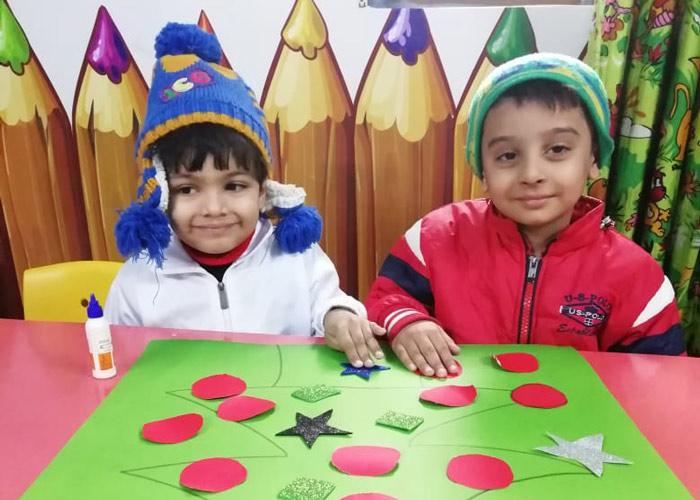
Mahavir Enclave | Vaishali Colony | Vijay Enclave | Dasrathpuri
Physical Health and Well-Being
Observable Behaviours: Children are active and developing the hand-eye coordination and visual acuity required for close attention to detail. They need small amount of food that are eaten at regular intervals.
Program consideration: Give children ample room and opportunity to roam, encourage them to use writing and drawing tools and make them eat healthy snacks and healthy lifestyle.
Social Knowledge & Competence
Observable Behaviours: Children begin to distinguish between acceptable and unacceptable social behaviour. They are also in just beginning of the capacity to relate to others. They need and enjoy social contact to develop a sense of themselves.
Program consideration: To support and praise acceptable behaviour, provide models and examples of appropriate ways of solving problems (e.g., using words, making positive choices) and present opportunities to become aware of the needs and ideas of others through discussions and sharing. We also provide models and examples of appropriate ways of solving problems (e.g., using words, making positive choices) and provide children with opportunities to become aware of the needs and ideas of others through discussions and sharing.
Emotional Maturity
Observable Behaviours: Children need to feel valued, have their own interests and ideas, express feelings with actions and words. They need others to be considerate and to attend to their personal needs.
Program consideration: We provide opportunities for children to express their own points of view, and make independent choices. They also recognize and accept individual strengths and differences. Our program provides support and, as appropriate, encourage the development of independence.
Cognitive Knowledge
Observable Behaviours: Children are eager to learn through interacting with the environment and they need continuity of experiences (e.g., new learning is connected to prior experiences). They also demonstrate different stages of recognition of letters and numerals along with related concepts.
Program consideration: Deliver Learning experiences that are concrete, active, interactive, and connected to the children’s world, establish consistent routines. Also plan a balanced, differentiated program with appropriate learning experiences that support and promote growth for each child and that are based on the learning expectations. On assessments in all five developmental areas
Provide learning opportunities and activities that enable children to work at their individual level of development.
Communication Skills and General Knowledge
Observable Behaviours: Child use language for self-regulation and for expressing needs, imagining, reasoning, and predicting. They speak in simple sentences and make themselves understood by peers and adults. They are in the phase of beginning to develop age-appropriate knowledge about the world around them and learn through exploration, play, discovery, investigation, inquiry, and modelling.
Program consideration: Our Program provides opportunities for children to use and develop language in a variety of contexts and for a variety of purposes (e.g., planned oral activities) take into account children’s stage of development in oral language. We also create contexts through which learning take place in ways that engage children and that build on and expand their learning.
Developmental Considerations for Play School Children
Young children come to school with an enormous capacity to learn. Important learning and development occur between birth and six years in all areas of human functioning – physical, social, emotional, cognitive, and linguistic. Children develop knowledge and skills at varying rates and through various means. Each child has unique strengths, interests, and needs that require teachers to adjust teaching methods and materials accordingly.
In addition to their own observations and the information provided by parents, teachers use the information available through the Early Identification of Children’s Learning Needs a process to determine individual children’s level of development, learning abilities, and needs. This identification procedure is part of an ongoing assessment process that boards are required to initiate when a child first enters school.
Our preschool program meet the needs of individual children and we consider a range of developmental assessments of individual children. The following major five areas of development are being taken care of by program designed for our young students.
Antidiscrimination Education
To ensure that all students in the province have an equal opportunity to achieve their full potential, the education system at our playschool is free from discrimination and provide all students with a safe and secure environment so that they can participate fully and successfully in the educational experience.
The implementation of antidiscrimination principles in education influences all aspects of school life. It promotes a school climate that encourages all students to work to high standards, affirms the worth of all students, and helps students strengthen their sense of identity and develop a positive self-image.
